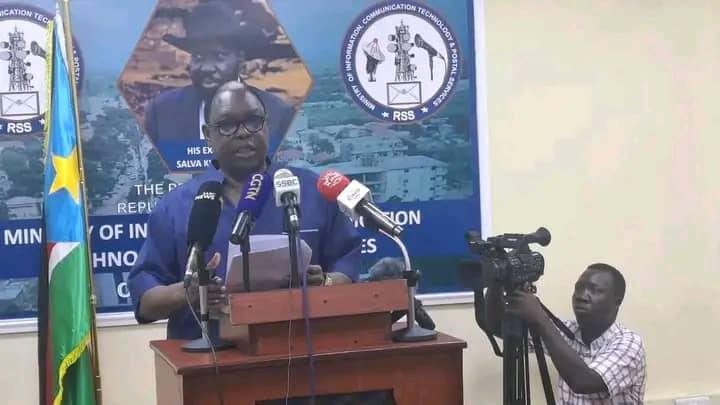Africa-Press – South-Sudan. South Sudan government stated on Saturday that nine out of sixteen Nuer counties are now considered “hostile,” citing deepening alliances between the main armed opposition SPLM-IO, led by First Vice President Riek Machar, and the White Army for escalating insecurity nationwide.
Speaking to reporters during a press conference in Juba, Martin Elia Lomuro, Minister of Cabinet Affairs and Secretary of the High-Level Standing Committee on peace implementation, reported that tensions have intensified to dangerous levels following deadly attacks by the White Army in Upper Nile State earlier this year.
Lomuro specifically identified Nasir, Ulang, Akobo, Nyirol, Uror, Pangak, Ayod, and Rubkona counties as centers of resistance, while describing counties such as Maiwut, Longechuk, and parts of Unity State as “friendly and supportive” of the government’s peace efforts.
“The Nuer ethnic group, one of the largest in South Sudan, played a significant and crucial role in the liberation of the country. This community spans, occupies, counties divided into four sub-sections….Out of these counties, nine of them are considered hostile to the government, primarily aligned with the SPLM-IO. These include Nasir, Ulang, Akobo, Nyirol, Uror, Fangak, Ayod, and Rubkona. Leaders from these areas hold influential political and military positions and maintain deep ties with this community leadership, including youth, women, and spiritual leaders,” Lomuro said.
“The seven remaining counties are deemed to be friendly to the government, including Mayendit, Maiwut, Longechuk, as well as Guit, Leer, Panyijar, Koch, and Mayom counties in Unity State,” the senior government official added.
The statement follows two months of heightened tensions between the two main signatories of the revitalized peace agreement, SPLM-IG and SPLM-IO, which began after deadly fighting between the White Army and the SSPDF in Nasir that resulted in the deaths of scores or hundreds of government soldiers, including Brigade Commander Major-General David Majur Dak.
The White Army is an ethnic Nuer armed youth group that fought alongside the main armed opposition SPLA-IO during the 2013-2018 civil war. However, the group lacks a clear political objective and has even grown hostile towards Machar after his return to Juba in early 2020 to form a government with Kiir.
Lomuro accused the SPLM-IO, whose leader has been detained since March 26 by security forces, of colluding with the White Army, despite the group’s claims of operating independently. He stated that an ongoing investigation into SPLM/SPLA (IO) leaders will provide the definitive evidence regarding the group’s ties to the White Army.
“While the SPLM/A-IO claims the White Army operates independently, their ties to the SPLM/A-IO are strong and inseparable. This can only be confirmed through the ongoing investigations, once the investigation is completed,” he said.
Tensions in Nasir escalated following Machar’s return to Juba between the armed youth and the SSPDF garrison stationed there. Locals have accused the soldiers in Nasir of crimes including rape and looting.
The latest escalation was triggered by a government attempt to disarm civilians in the area, which locals believe would leave them vulnerable to SSPDF atrocities. They subsequently launched an attack on the SSPDF Brigade in Wec Ayar, west of Nasir, killing the commander.
Following the escalation of tensions in February and March, Machar and several of his top officials were placed under house arrest in Juba, pending investigations into the events surrounding the Nasir fighting. This move triggered political shockwaves and intensified divisions within SPLM/A-IO ranks, further fragmenting the opposition as a minister in Juba decided to replace Machar as an interim leader until his release.
“The Nasir crisis has fragmented the SPLA-IO into four factions, now as we speak. One, there are SPLM-IO who are under investigation because they are in conflict with the law and the constitution. There are SPLM-IO who are in hiding. They are here in Juba, and elsewhere within our country. There are also SPLM-IO who have decided to exile themselves. They ran away. And there are those who are in government with us,” he said.
The tensions have not been confined to Upper Nile. Fighting has also erupted in Central Equatoria State between government forces and SPLA-IO elements, while opposition forces launched a separate attack on Pigi County in Jonglei State in an attempt to cross to Upper Nile State, further straining the already fragile peace agreement.
Lomuro reported that his government has received intelligence indicating that some SPLA-IO defectors are collaborating with Sudan’s rebellious paramilitary Rapid Support Forces (RSF) and are planning to form new rogue alliances, threatening to destabilize the country.
“The Government of the Republic of South Sudan has received credible intelligence concerning a former officer of the SPLM/A-IO who defected and engaged in combat operations alongside the Rapid Support Forces (RSF) in Eastern Sudan,” he said.
“It has come to our attention that the said officer is currently in Western Bahr-el-Ghazal and is reportedly planning to travel to Western Equatoria State to establish contact with Futuyo Karaba, the former governor previously dismissed from office due to corruption,” he added.
South Sudan’s 2018 Revitalized Peace Agreement, known as R-ARCSS, aimed to end the civil war and establish a unified army and government. However, persistent parallel command structures, unresolved security arrangements, and distrust between former rivals have hindered progress.
Lomuro emphasized that the government remains committed to the peace roadmap and called for renewed efforts by the international community, the African Union, and IGAD to hold all actors accountable.
“We also appeal to the international community, IGAD, the African Union, and our development partners to closely monitor these developments, work collaboratively with our security and diplomatic institutions, and lend renewed support to the ongoing implementation of the Revitalized Peace Agreement,” he concluded.
For More News And Analysis About South-Sudan Follow Africa-Press






